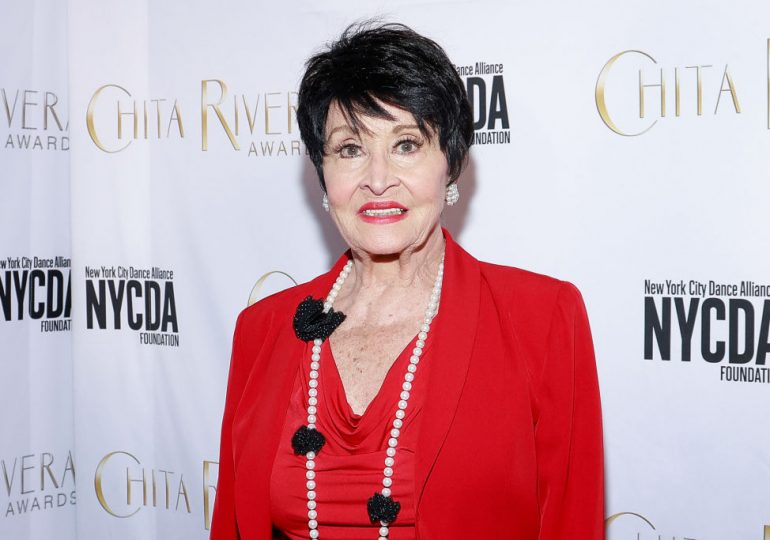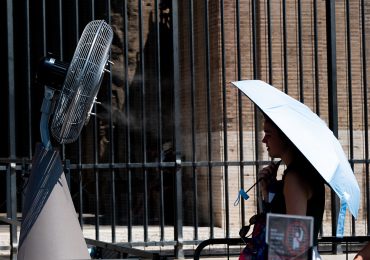Chita Rivera, the dynamic dancer, singer and actress who garnered 10 Tony nominations, winning twice, in a long Broadway career that forged a path for Latina artists and shrugged off a near-fatal car accident, died Tuesday. She was 91.
Rivera’s death was announced by her daughter, Lisa Mordente, who said she died in New York after a brief illness.
[time-brightcove not-tgx=”true”]
Rivera first gained wide notice in 1957 as Anita in the original production of “West Side Story” and was still dancing on Broadway with her trademark energy a half-century later in 2015’s “The Visit.”
“I wouldn’t know what to do if I wasn’t moving or telling a story to you or singing a song,” she told The Associated Press then. “That’s the spirit of my life, and I’m really so lucky to be able to do what I love, even at this time in my life.”
In August 2009, Rivera was awarded the Presidential Medal of Freedom, the highest honor the U.S. can give a civilian. Rivera put her hand over her heart and shook her head in wonderment as President Barack Obama presented the medal. In 2013, she was the marshal at the Puerto Rican Day Parade in New York City.
Rivera rose from chorus girl to star, collaborating along the way with many of Broadway’s greatest talents, including Jerome Robbins, Leonard Bernstein, Bob Fosse, Gower Champion, Michael Kidd, Harold Prince, Jack Cole, Peter Gennaro and John Kander and Fred Ebb.
She rebounded from a car accident in 1988 that crushed her right leg and became an indefatigable star on the road. She was on Broadway in a raucous production of “The Mystery of Edwin Drood” in 2012 and the chilly “The Visit” in 2014, earning another best actress Tony nomination.
“She can’t rehearse except for full-out,” said playwright Terrence McNally in 2005. “She can’t perform except for full-out, no matter what the size of the house. She’s going to be there 101% for that audience.”
She won Tonys for “The Rink” in 1984 and “Kiss of the Spider Woman” in 1993. When accepting a Tony Award for Lifetime Achievement in 2018, she said “I wouldn’t trade my life in the theater for anything, because theater is life.”
She was nominated for the award seven other times, for “Bye Bye Birdie,” which opened in 1960; “Chicago,” 1975; “Bring Back Birdie,” 1981; “Merlin,” 1983; “Jerry’s Girls,” 1985; “Nine,” 2003; and “Chita Rivera: The Dancer’s Life,” 2005.
“I don’t think we have enough original musicals,” she told The Associated Press in 2012. “I know I’m being old fashioned, but the theater is the place where music, lyrics, words, scenery and stories come together. And I’ve been blessed enough to have done several shows when they really did. They take you places and they’re daring. That’s what we need.”
Her albums include 16 tracks pulled from her original cast recordings and put out as part of Sony’s Legends of Broadway series and two solo CDs — “And Now I Sing” for a tiny record label in the 1960s and “And Now I Swing” in 2009 for Yellow Sound Label.
In the 1993 musical “Kiss of the Spider Woman,” Rivera played the title role, a glamorous movie star at the center of the fantasy life of an inmate in a South American prison. The story, from a novel by Manuel Puig, had already been made into an Oscar-winning 1985 movie.
In his review, then-Associated Press drama critic Michael Kuchwara wrote that Rivera “is more than a musical theater star. She’s a force of nature — which is exactly what is needed for the role of the Spider Woman. With her Louise Brooks haircut, brassy voice and lithe dancer’s body, Rivera dominates the stage whenever she appears.”
In 1975, she originated the role of Velma Kelly (to Gwen Verdon’s Roxie Hart) in the original Broadway production of “Chicago.” Rivera had a small role in the 2002 film version, while Catherine Zeta-Jones won the best supporting actress Oscar as Velma — just as Rita Moreno had picked up an Oscar for her portrayal of Anita in “West Side Story.”
The songwriters for “Chicago,” Kander and Ebb, also wrote Rivera’s first Tony-winning performance, for “The Rink.” In winning the Tony for best actress in a musical, Rivera topped the show’s top star, Liza Minnelli, who also had been nominated. The two played a mother and daughter who struggle to rebuild their relationship after a long estrangement; the setting is an old-fashioned roller rink that has seen better days.
“Spider Woman” had been her first Broadway show since 1986, when she suffered a broken leg in the traffic accident while she was appearing in “Jerry’s Girls,” a Broadway tribute to the songs of Jerry Herman.
At the Tony awards a few weeks later, she flashed her cast and belted out “Put on a Happy Face” from the musical “Bye, Bye, Birdie.”
It took months of physical therapy to bring back her dancing skills. She told The Associated Press: “It never entered my mind that I wouldn’t dance again. Never. I can’t explain to you why. It’s hard work getting back but that’s what I’m doing.”
“My spirit is still there.”
Dolores Conchita Figueroa del Rivero was born Jan. 23, 1933, in Washington, D.C. Her Puerto Rican father, Pedro del Rivero, was a musician who played in the United States Navy Band, who died when she was 7. Her mother was Scottish and Italian descent.
She took dance classes and then entered the prestigious School of American Ballet in New York. Her first theater gig, at age 17, was in the touring company of “Call Me Madam.” That led to chorus stints in such shows as “Guys and Dolls” and “Can-Can.”
In her 2023 memoir, “Chita: A Memoir,” another woman steals scene after scene: her self-proclaimed alter ego, Dolores. Unapologetic and fiery, Dolores was the unfiltered version of Chita and served as motivation in times of self-doubt. In one chapter, Rivera writes that she doesn’t read reviews “or Dolores just might invest in a dozen voodoo dolls.”
“I consist of — and I think we all do — I consist of two people: Dolores and Conchita,” Rivera sain in an interview with the AP that year. “Conchita, she’s the one that has been taking all the glory, you know. She’s been doing all the shows, but Dolores is the one that’s pushed her into it. And she’s been keeping me on track, so I listen to Dolores. I listen to her. She’s growing in my head now as we speak.”
Among other early appearances on the New York stage were roles in “The Shoestring Revue,” 1955; a 1955 musical version of “Seventh Heaven” starring Ricardo Montalban; and “Mr. Wonderful,” a 1956 show starring Sammy Davis Jr.
“I can’t believe that I’ve been given the gift to look back and relive my life,” she told The Associated Press shortly before “The Dancer’s Life” opened on Broadway in late 2005. “It’s about how anybody can do it — if you really believe it, you have the good fortune, you do all the right things and you really work hard.”
Rivera, who had a relationship with the now-deceased Davis, married fellow “West Side Story” performer Tony Mordente in 1957. The marriage ended in divorce. Their daughter, Lisa Mordente, also became a performer who occasionally appeared on Broadway, garnering a Tony nomination in 1982 for “Marlowe.”
Leave a comment








